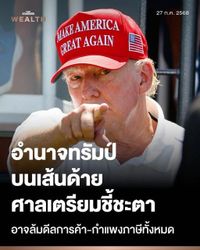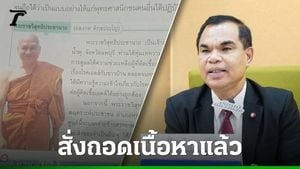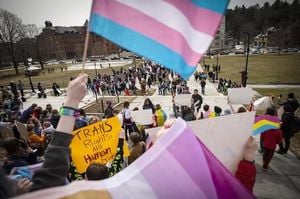On July 27, 2025, heightened tensions along the Thailand-Cambodia border prompted a series of security actions and warnings as both sides grapple with ongoing conflict and espionage concerns. Authorities in Thailand detained a suspicious man near the border, while the Royal Thai Police and military reinforced their vigilance against potential spies and strategic threats amid escalating hostilities.
Earlier that day, security officials apprehended a man identified as Mr. Sirikorn Phoomlamnao, aged between 40 and 50, from Sa Kaeo province. He was found driving a bronze-silver sedan with a Sa Kaeo license plate, cruising the border area while taking photographs of various locations. When questioned, Sirikorn claimed he was visiting his grandmother and intended to deliver a Buddha amulet, suggesting local ties. However, further investigation revealed that his phone's GPS had a pinned location at Prasat Ta Muen Thom, a notable border temple complex, raising suspicions about his true intentions.
Authorities detained Sirikorn at 11:30 a.m. and upon examination found only him in the vehicle, despite his claim of traveling with three others from Aranyaprathet, a nearby border town. His Thai language skills were unclear, and after verifying his national ID card, officials contacted his relatives. They confirmed that Sirikorn is a mental health patient with an official patient card, prompting authorities to arrange for his family to take him into care. Prior to this, another suspicious individual was observed riding a motorcycle along the same route, stopping to take numerous photographs before retracing his path. This person claimed the images were for his sister, but police remained skeptical and continued their investigation.
Deputy Spokesperson of the Royal Thai Police, Police Major General Sirivath Deepo, outlined behaviors that raise red flags for potential espionage activities. These include covertly filming military units or strategic points, monitoring troop movements and equipment deployment, frequently photographing military operation areas without justification, entering restricted zones without permission, and possessing suspicious gear such as long-range cameras, GPS devices, or detailed maps. He urged the public to report any individuals exhibiting these behaviors to local security forces or via hotlines 191 and 1599, which operate 24/7.
Meanwhile, Police General Kittirat Phanphet, Commander of the Royal Thai Police, made a high-profile visit to Sri Sa Ket province on the same day. He went to Sri Sa Ket Hospital to encourage Police Sergeant Major Watchira Kusapan, who was wounded by shrapnel during a Cambodian attack on a convenience store in the province. General Kittirat also provided personal financial assistance to the injured officer.
Following this, he visited a refugee center located at a temple in Phayu district, where civilians from Kantharalak district had fled due to the ongoing conflict. General Kittirat emphasized the dual role of the police force in the border provinces: the frontline border patrol police support the military in combat operations, while local police manage the safety and property of displaced civilians in the rear areas.
He instructed heightened vigilance against suspicious individuals who might be enemy spies aiming to identify strategic points within Thailand. This directive aligns with the broader security concerns as the conflict between Thailand and Cambodia intensifies.
Adding to the diplomatic and military dynamics, Lieutenant General Ling Hong, the Chinese People's Liberation Army military attaché in Thailand, met with General Kittirat to discuss the evolving war situation between the two neighboring countries. This meeting underscored the regional interest and involvement in the conflict's developments.
On the military front, the Royal Thai Army deployed VT-4 tanks into combat for the first time, marking a significant escalation. These tanks were used to attack and disrupt Cambodian military supply lines, signaling Thailand’s commitment to maintaining control over contested border areas.
Former human rights commissioner and legislative official Somchai Sawangkan warned against yielding to external pressures, specifically mentioning the so-called 'Trump tax' negotiations. He cautioned that any retreat under such pressure could embolden neighboring countries to repeatedly infringe upon Thai sovereignty.
The latest battlefield reports indicate seven highly tense zones along the border, with Cambodia intensifying attacks ahead of scheduled negotiations. Cambodian forces have established sniper positions near the Preah Vihear Temple and deployed tanks through narrow passages aiming to seize strategic locations like the 'Kwai' area. Thai forces have responded firmly, maintaining control over key points such as the Anma Pass and monitoring troop movements heading south. While rumors circulated about the death of a Cambodian general, Thai officials have neither confirmed nor denied this information and urged the public to avoid spreading unverified reports.
These developments paint a picture of a border region fraught with danger and uncertainty. The Thai government and security forces are doubling down on measures to protect their territory and civilians, while remaining alert to espionage threats and military maneuvers. As the conflict continues to unfold, the vigilance of both authorities and the public remains crucial in safeguarding national security.




